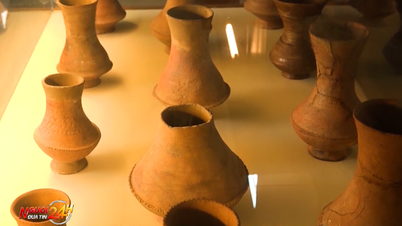Causes of calcium deficiency
Calcium deficiency has many causes, the older you are, the higher the risk of calcium deficiency. This deficiency can be due to:
+ Insufficient calcium supplementation over a long period of time, especially in childhood.
+ Use drugs that reduce calcium absorption.
+ Dietary intolerance to foods rich in calcium.
+ Hormonal changes, especially in women.
+ Genetic factors.
In fact, the most common cause of calcium deficiency is a lack of vitamin D, phosphorus and magnesium in the diet, which reduces calcium absorption, calcium deficiency due to hypoparathyroidism, infection...
According to the report of the National Institute of Nutrition, in recent years, the daily menu of Vietnamese people has changed a lot, including increasing the amount of meat and fat. In urban areas, the average meat consumption is 154 grams per person per day, while the recommendation is 70 grams. Therefore, Vietnamese people receive more lipids from animal sources than lipids from plant sources.
The diet tends to increase protein with an increase in phosphorus but not calcium, mainly increasing animal protein. Therefore, the calcium intake of Vietnamese people only meets 50% of the recommended calcium needs.
The little amount of calcium is excreted due to the habit of eating too much protein and too much salt. Vietnamese people eat 3 times more salt than recommended, with more than 15mg of salt per day.
Signs of calcium deficiency
When calcium deficiency often has the following symptoms:
– Frequent cramps.
– Muscle pain, especially in the thighs, arms… when moving, walking, or sleeping.
– Tooth decay, slow tooth growth (in children).

Calcium deficiency can lead to many serious consequences in both adults and children.
The best way to prevent calcium deficiency
Calcium can be supplemented through the foods we eat every day or by taking calcium supplements. However, the safest and most effective way is to supplement calcium through diet, and calcium supplements should not be taken arbitrarily.
Food groups to use:
Add 3 servings of milk to your daily diet (choose milk that is high in calcium).
Eat a variety of foods, choose food groups rich in calcium, vitamin D, magnesium, zinc...
+ Choose animal protein from shrimp, crab, sea fish, snails, eggs, milk and dairy products.
+ Vegetable protein: Sesame, soybeans, wood ear mushrooms, beans, especially soybeans and nuts such as walnuts, almonds...
Vegetables, spinach, broccoli, okra, white beans, cereals, almonds…
You should only take oral calcium supplements as prescribed by your doctor. Exercise regularly every day to improve your health. In particular, spending at least 10 to 20 minutes sunbathing in the morning (from 9am to 9:30am every day) will help your body absorb more vitamin D, which is essential for absorbing and metabolizing calcium in the body.
Foods to avoid:
Eating too much protein will affect calcium excretion through the urinary tract, increasing the risk of kidney stones.
Do not use foods rich in calcium with foods rich in iron (because iron reduces calcium absorption in the body and vice versa), red meat, dark green vegetables...
Foods containing a lot of oxalic acid, phytic acid, fatty acids because calcium ions when combined with positive ions in foods containing a lot of phytic acid, oxalic acid and fatty acids... will form insoluble calcium salts. Calcium salts will be excreted in feces and urine.
Green tea: Tannins in green tea inhibit the body's absorption of calcium.
Stimulant drinks such as alcohol, beer, coffee, etc.
Do not fast because it reduces phosphate in the body, causing hypocalcemia.
Calcium supplements should only be taken if there is a severe calcium deficiency. The following people often have a diet lacking in calcium-rich foods and may need to take calcium supplements as prescribed by their doctor:
- Vegetarians, especially vegans.
- People with lactose intolerance and drink little milk.
- People who eat a lot of meat or salt, causing the body to excrete a lot of calcium, have osteoporosis.
- People with the disease must use corticosteroids for a long time.
- People with digestive tract diseases that do not absorb calcium such as enteritis or celiac disease.
What to do when calcium deficiency?
To provide enough calcium for the body, babies need to be breastfed fully from birth. When babies start eating solid foods (from 5 to 6 months), in addition to breastfeeding, it is important to prepare calcium-rich foods in the baby's menu. When they reach puberty and adulthood, calcium-rich foods still need to be prioritized in the daily diet.
Eat a varied diet, using foods rich in calcium such as shrimp, crab, fish, fish with bones, snails, sesame, soybeans, wood ear mushrooms, Malabar spinach, eggs, especially egg yolks, milk and dairy products...
The diet should provide enough protein. If the diet contains too much protein compared to the recommended needs, the body will increase the risk of calcium deficiency. Too much protein in the diet will increase the excretion of calcium through the urinary tract and increase the risk of kidney stones. Limit the intake of coffee, alcohol and salt, because these substances often inhibit the ability to absorb calcium.
Use calcium supplements in case of high calcium deficiency as directed by your doctor.
Vitamin D helps regulate calcium levels in the blood and bones, helping the body absorb calcium better. Therefore, in addition to supplementing calcium-rich foods, we need to pay attention to choosing foods rich in vitamin D such as seafood, eggs, milk... in our meals to provide vitamin D for the body.
In addition, you should spend at least 10 - 20 minutes sunbathing in the morning (9am - 9:30am every day) to help your body absorb more vitamin D through your skin. Your diet should include enough fat so that vitamin D can be better absorbed through the digestive tract.
Dr. Nguyen Van Dung
Source: https://giadinh.suckhoedoisong.vn/bien-phap-tot-nhat-phong-ngua-thieu-canxi-172240614213516223.htm
























![[Infographic] Vietnam-Senegal traditional friendship](https://vphoto.vietnam.vn/thumb/1200x675/vietnam/resource/IMAGE/2025/7/23/4c96a604979345adb452af1d439d457b)














































































Comment (0)